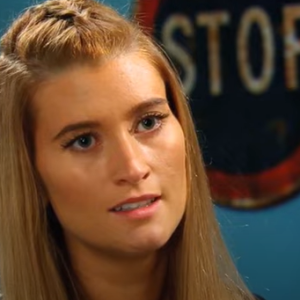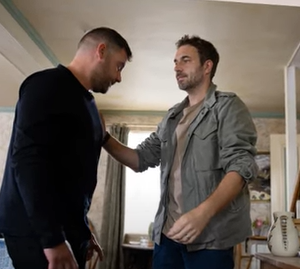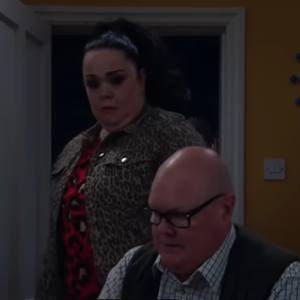Emmerdale jolted its fans this week with a tiny but devastating moment that carried the kind of emotional weight only soaps can deliver: an off‑screen phone call that made viewers sit up and remember Debbie Dingle, the daughter who walked away and left a hole in the Dingle clan. It wasn’t a flashy return, no dramatic arrival at the bridge or a midnight car screeching into the village — it was quieter, more cutting: Cain Dingle, gruff and worn, walking through the streets with a phone pressed to his ear as the voice of Debbie came down the line from Australia. The shock was twofold — first, that Debbie was alive and well enough to call, and second, that she’d been living a whole new life far from the people who’d been waiting and hurting. For long‑time viewers, that phone call landed like a dropped stone in a still pond; ripples of anger, longing and unfinished business spread through the village just from the hint of her voice. And the writing made sure every syllable stung: Cain’s mixture of bluntness and barely concealed tenderness — “If you felt that bad, you’d have made it to Nate’s funeral” — cut deep. The words weren’t just criticism; they were grief disguised as accusation, the kind that only a fractured parent could speak. By choosing this understated route, Emmerdale reminded us that absence can be as dramatic as an entrance, and that sometimes the smallest moments reopen the largest wounds.
The revelation that Debbie has settled in Australia with a new husband, Chris, reframes months of off‑screen silence and exposes a messy web of secrets and resentment back in the UK. Earlier this year viewers were already blindsided when Sarah Sugden, Debbie’s daughter, tried to reach her and discovered Debbie had left for a fresh life abroad — a truth that detonated into the family when Charity found out and called her daughter a “little cow.” That outburst from Charity was more than a petty insult; it revealed the raw betrayal felt by those left behind. Debbie’s choice to start again so abruptly presents her in two colours at once: as a woman seeking peace and a mother who abandoned obligations. Soap writers know how to keep a character alive in viewers’ imaginations by dangling sporadic mentions like breadcrumbs, and here those breadcrumbs have been deliberately placed to provoke furious debate: Is Debbie selfish or is she surviving? Is she cowardly, or did she make a decision that, in her mind, was necessary for her own sanity? The answer, as ever with Emmerdale, refuses to be neat. That ambiguity makes Cain’s reaction more poignant; his blunt refusal to promise anything when she asks to reconnect is heartbreak wrapped in stubbornness, and it shows how deep the family’s wounds run. There’s a particular cruelty in a voicemail that says more than a face‑to‑face confrontation ever could — because it leaves everyone else to imagine what might have been said or done.
For Cain, the call may be small in screen time but colossal in consequence: it forces him to face choices he’s been dodging and grief he thought he’d managed to shelve. The scene plays out like a moral and emotional crossroads, with Cain’s brusque “I’ll see what I can do” carrying the weight of a man who does not easily forgive but also cannot wholly cut himself off from hope. The suggestion that he might consider a journey to Australia — even briefly — opens a door to a storyline brimming with possibility. Will Cain fly out to confront the woman who left him, or will he stay anchored in the village, making peace with imperfect answers? Either route offers juicy drama: a reunion would be explosive, filled with accusations, revelations and the kind of fractious catharsis soaps live for; a decision to stay put would be a slow burn, tilting into simmering resentment, missed chances and the corrosive ache of what-ifs. Meanwhile, the mere suggestion that Debbie remains part of the family’s orbit means other characters will shift too — Sarah’s identity, Charity’s maternal role, Nate’s memory, and the Dingles’ mythos all tilt ever so slightly. Emmerdale has expertly positioned Debbie as an invisible axis upon which other people’s stories turn, and this tiny call proves she still has the power to destabilise lives without even stepping back into the frame.
The writers’ clever handling of Debbie’s absence also allows other characters — notably Charity — to grow into roles Debbie once held, creating fresh emotional terrain and carrying narrative momentum forward. Emma Atkins’ Charity has been given room to be the maternal figure in Sarah’s world, and that casting of responsibility invites complex scenes that keep viewers invested. Charity’s explosive reaction to discovering Debbie’s new life was not mere jealousy — it was a raw expression of being left to shoulder grief and anger for a woman who walked away without warning. This is fertile territory for empathy and ire to collide; Emmerdale’s audience is asked to feel for Charity’s betrayal while also understanding Debbie’s need to reinvent herself. The show’s choice to keep Debbie on the periphery, mentioned but absent, fuels speculation and conversation among fans: could Charlie Webb return? Is a cameo on the horizon? Or will the writers continue to use Debbie as a ghostly presence whose decisions shape others’ arcs? Each mention creates narrative momentum while respecting the actor’s real‑world choices, and it’s a delicate balancing act that Emmerdale manages with skill. The emotional echo of Debbie’s choice will continue to reverberate, pushing characters into new conflicts and alliances, and the unresolved tension feeds the village’s simmering drama. 
Ultimately, the surprise Debbie Dingle update is a reminder of Emmerdale’s longstanding skill: using small, intimate moments to launch big emotional storylines. A single phone call can reopen history, recalibrate relationships, and force characters to confront painful truths they’d rather keep buried. Fans may debate whether Debbie was right to leave or cruel to abandon her family at a time of need, but whether you defend her or condemn her, the result is the same — lives are shifted and the village story map is redrawn. Emmerdale has chosen nuance over spectacle, and in doing so it has given viewers something more satisfying than a cheap shock: an invitation to sit with complicated feelings about family, responsibility and the messy business of starting again. The phone call to Cain proves that characters can haunt a show even from afar, and it leaves the door open — not with a clanging slam, but a hesitant, creaking crack — for whatever might come next.





